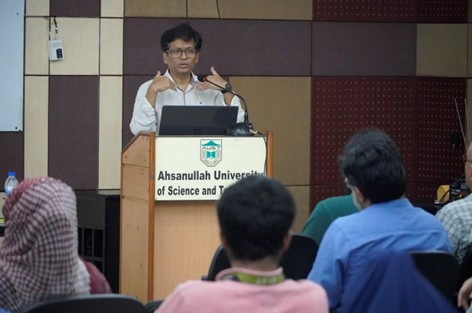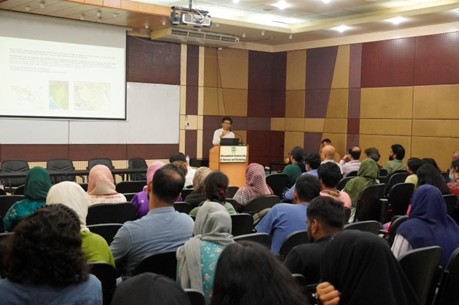Date: 2025-08-13
The Seminar and Workshop Organizing Committee, Department of Architecture, AUST, organized a seminar titled “Partition of Bengal-1947 and its impact on Architecture, Culture & Identity” presented by esteemed Architect Taufiqur Rahman Khan at the VC Seminar Room on July 3rd, 2025. The Honorable Vice Chancellor Prof. Dr. Md. Ashraful Hoque; Dr. Farida Nilufar, Dean of the Faculty of Architecture and Planning and Ar. ABM Mahbubul Malik, Head of the Department of Architecture, and Dr. Shehzad Zahir, Convener of Seminar and Workshop Organizing Committee, were present in the program. The seminar was conducted by Ar. Rifat Bin Ali, Lecturer, Department of Architecture, AUST.

Taufiqur Rahman Khan earned his B.Arch degree in 1999 from the Bangladesh University of Engineering and Technology. Following his graduation, he joined URBANA, where he collaborated with esteemed architects Kashef Mahbub Chowdhury and Marina Tabassum, serving as the project architect for significant initiatives such as the Museum of Independence and the Master Plan for Historic Suhrawardy Udyan from March 1999 to July 2000. Currently, he is the Principal Architect at METROPOLIS Architects and also serves as the Coordinator for the Ecole de Design at the Alliance Française de Dhaka. He has a strong interest in history and philosophy, channeling this passion into his work as an independent researcher. His current research focuses on the impact of the 1947 Partition of South Asia on various artistic expressions in Bangladesh and other regions of South Asia. Additionally, he is actively engaged in the 23rd Executive Committee of the Institute of Architects Bangladesh (IAB), fulfilling the role of Secretary for both the Seminar and Convention.
In the session, the speaker shared compelling reflections on the significance of partition on cultural and historical identity in the context of Bangladeshi architecture. He stressed that before creating architecture, it is essential to understand ourselves—our culture, our roots, and our political history. The architect argued that while the years 1952 and 1971 are commonly emphasized in our national narrative, events such as the 1905 Partition of Bengal and the 1947 Partition of India are equally vital in shaping our identity. He urged the younger generation to explore these interconnected phases of history to fully grasp the roots of our nationhood. Highlighting the geographical uniqueness of Bangladesh, he noted that the country’s dynamic delta system and alluvial soil are foundational elements—not just in agriculture, but in architecture and culture. While institutions teach about water bodies, the architectural significance of fertile soil is often overlooked. Historically, this natural potential made Bengal a site of intense geopolitical interest, particularly for trade. As a result, foreign powers imposed their own ideologies through placemaking strategies, leaving architectural imprints—Carzon Hall being a prominent example, blending Mughal and British styles into what is now known as Indo-Saracenic Architecture.

In contrast, figures like Kazi Nazrul Islam emerged as unifying voices across religious and social divides. The architect recommended several works for deeper understanding, including Khoabnama by Akhtaruzzaman Elias and Konthoshshor, a newspaper that captures key narratives for younger audiences.In an engaging Q&A session, he concluded by urging participants to move beyond simplistic patriotic slogans. “Instead of just saying we gained freedom from Pakistanis,” he said, “let us celebrate Bangladesh as a land of rivers, the world’s largest delta—a vibrant, colorful nation shaped by nature and history.”
Ar. Naimul Aziz, Associate Professor, Department of Architecture, AUST, presented his view towards the students and thanked the speaker for sharing his valuable insight. He emphasized that these types of seminars are very effective for the students, as architecture is a professional education. He also encouraged the organizing committee for the initiative. The volunteers actively participated in the event. After the presentation, Dr. Shehzad Zahir presented the speaker, Ar. Taufiqur Rahman Khan with a token of appreciation, marking the end of a successful event. The Seminar and Workshop Organizing Committee is at present consisted of Dr. Shehzad Zahir, Ar. S.M. Arafat Hossain, Ar. Zareen Jahan Khan and Ar. Rifat Bin Ali.